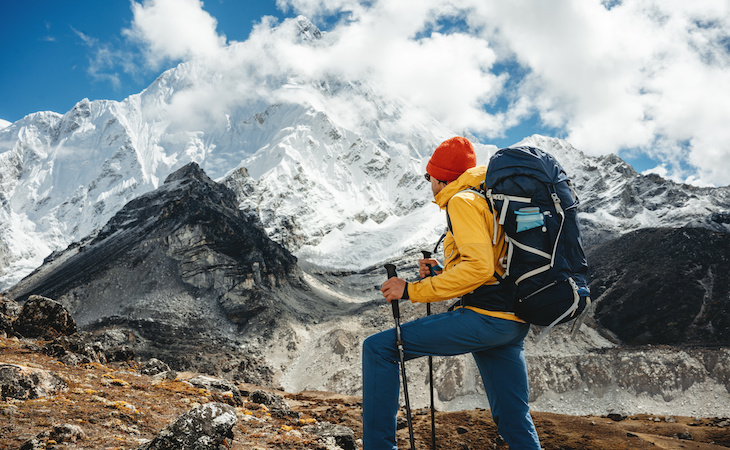
Traveling to high altitudes can cause altitude sickness and disrupt sleep due to reduced oxygen levels. Symptoms include headaches, dizziness, and breathing issues like periodic breathing or central sleep apnea. To improve sleep, acclimate gradually, stay hydrated, use extra pillows, avoid alcohol, and maintain your normal bedtime routine.
When you reside at a lower altitude, going to a high altitude can cause sickness—and even trouble sleeping—in some people.
“Traveling to high altitudes can sometimes cause health problems,” says Raj Dasgupta, MD, chief medical advisor for Sleepopolis. This group of problems is called “high-altitude illness.”
“This can happen if you live at a low altitude and go to the mountains or a city that is at high altitude like Denver, Colo.,” he says. There are different types and severities of high-altitude illness, the most common of which is called “acute mountain sickness,” he adds.
“When you go to a high altitude, the air pressure drops and there’s less oxygen available,” explains Dasgupta. “Your body works harder to get enough oxygen, and if you don’t give it time to adjust, you can develop altitude sickness, which is your body’s way of reacting to the changes.”
If you’re worried about feeling sick, or having difficulty sleeping, read on for strategies for sleeping at a high altitude.

How high altitude impacts sleep quality
Sleeping at an altitude you’re not used to can be tough because the lower oxygen levels can affect your breathing patterns.
“People often experience periodic breathing—basically, a cycle of fast deep breaths followed by apneas (lack of breathing) or shallow, slow breaths, which can cause frequent awakens and resulting in poor quality sleep overall,” says Dasgupta.
The symptoms can differ depending on the type of high-altitude illness you have. Acute mountain sickness can happen within a day of traveling or climbing to a very high altitude. You might develop headaches, nausea, dizziness, or you might feel “just really wiped out,” says Dasgupta
You may even notice a faster heartbeat or feel short of breath, even at rest. Sleep issues are also common. “If you have these symptoms, do not travel or climb any higher until you feel better,” says Dasgupta. You should feel better within a day or so, he adds.
Since it causes breathing issues, it should come as no surprise that sleep apnea at a high altitude can worsen. In fact, according to Dasgupta, high altitudes can even trigger a type of apnea called “central sleep apnea” in people who don’t normally have it.
“This happens because your body’s oxygen and carbon dioxide balance shifts at altitude, disrupting your normal breathing rhythm during sleep,” he says.

Tips for sleeping better at high altitude
1. Give yourself time
To decrease incidence of symptoms, and potentially improve your sleep, Dasgupta recommends giving yourself time to adjust. “Avoid climbing too fast,” he says.
2. Stay hydrated
“Drink plenty of water and cut back on alcohol and caffeine,” says Dasgupta. Alcohol and caffeine are both dehydrating and can exacerbate altitude sickness.
3. Load up on pillows
When you have trouble sleeping at an altitude you’re not accustomed to, and your breathing is affected, Dasgupta suggests using extra pillows to prop yourself up when you’re sleeping.
4. Focus on breathing
“Do calming breathing exercises before bed,” says Dasgupta. This can help improve your breathing and relax your body so it’s easier to fall asleep.
5. Stick to your routine
Although you might be feeling off, Dasgupta says it’s important to stick to your regular sleep routine “to keep your circadian rhythm steady.”
FAQs
What helps you sleep at high altitude?
Dasgupta recommends things like giving yourself time to climb, staying hydrated, sleeping with propped-up pillows, breathing exercises, and sticking to a routine as things that can help you sleep at a higher altitude.
Why can’t I sleep in Colorado?
“When you go to a high altitude, the air pressure drops and there’s less oxygen available,” explains Dasgupta. “Your body works harder to get enough oxygen, and if you don’t give it time to adjust, you can develop altitude sickness, which is your body’s way of reacting to the changes.” Breathing problems can lead to sleep issues.
What’s the best sleep aid for altitude?
“It is strongly advised to avoid taking sleeping pills when traveling to high altitudes,” says Dasgupta. “Sleeping pills can exacerbate altitude sickness symptoms by reducing your respiratory drive, which can potentially worsen blood oxygen levels during sleep.”
To improve sleep at high altitude, prioritize gradual acclimatization, stay hydrated, and create a comfortable sleep environment, he says. You should also avoid alcohol and limit caffeine intake, adds Dasgupta.
How can I breathe better at high altitude?
“To improve breathing at high altitudes, practice deep, abdominal breathing, slow your exhalation, and consider breathing exercises like pursed-lip breathing or diaphragmatic breathing,” says Dasgupta. “Acclimatizing to altitude by gradually ascending and taking rest days also helps your body adjust to the lower oxygen levels.” Staying well-hydrated can also help. “If you’re really struggling, it’s safest to head to a lower altitude,” he says.
Next, read our guide to sleeping better while traveling to help you catch Z’s while on the road.
Shelby Deering
Shelby Deering is a Madison, Wisconsin-based freelance lifestyle writer contributing home design and health articles to national publications. When she’s not writing, you’ll find her hiking, running, or walking with her husband and corgi, Dolly.



